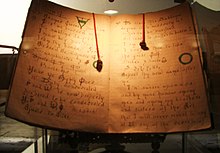
Back Gardnerianismo AN ويكا غاردنيرية Arabic جاردنريان ويكا ARZ Wica Gardneraidd Welsh Gardenisches Wicca German Gardnerismo Esperanto Wicca gardneriana Spanish Gardnérianisme French Wicca gardneriana Galician Gardnerijanska Wicca Croatian
| Gardnerian Wicca | |
|---|---|
 Gardner's Book of Shadows | |
| Abbreviation | GW |
| Type | Wicca |
| Classification | British Traditional Wicca |
| Governance | Priesthood |
| Region | United Kingdom, United States and Australia |
| Founder | Gerald Gardner |
| Origin | 1954 Bricket Wood, United Kingdom |
| Members | Fewer than 1,000 |
| Other name(s) | Gardnerian witchcraft |
Gardnerian Wicca, or Gardnerian witchcraft, is a tradition in the neopagan religion of Wicca, whose members can trace initiatory descent from Gerald Gardner.[1] The tradition is itself named after Gardner (1884–1964), a British civil servant and amateur scholar of magic. The term "Gardnerian" was probably coined by the founder of Cochranian Witchcraft, Robert Cochrane in the 1950s or 1960s, who himself left that tradition to found his own.[2]: 122
Gardner claimed to have learned the beliefs and practices that would later become known as Gardnerian Wicca from the New Forest coven, who allegedly initiated him into their ranks in 1939.[3] For this reason, Gardnerian Wicca is usually considered [by whom?] to be the earliest created tradition of Wicca, from which most subsequent Wiccan traditions are derived.
From the supposed New Forest coven, Gardner formed his own Bricket Wood coven, and in turn initiated many Witches, including a series of High Priestesses, founding further covens and continuing the initiation of more Wiccans into the tradition.[citation needed] In the UK, Europe, and most Commonwealth countries, someone self-defined as Wiccan is usually understood[by whom?] to be claiming initiatory descent from Gardner, either through Gardnerian Wicca, or through a derived branch such as Alexandrian Wicca. Elsewhere, these original lineaged traditions are termed "British Traditional Wicca".
- ^ Esomba, Steve (6 June 2012). The Book of Life, Knowledge and Confidence. Lulu.com. ISBN 9781471734632.
- ^ Cite error: The named reference
Valiente89was invoked but never defined (see the help page). - ^ Heselton, Philip (2020). In Search of the New Forest Coven. Nottingham, UK: Fenix Flames Publishing. p. xiv. ISBN 978-1-913768-00-3.